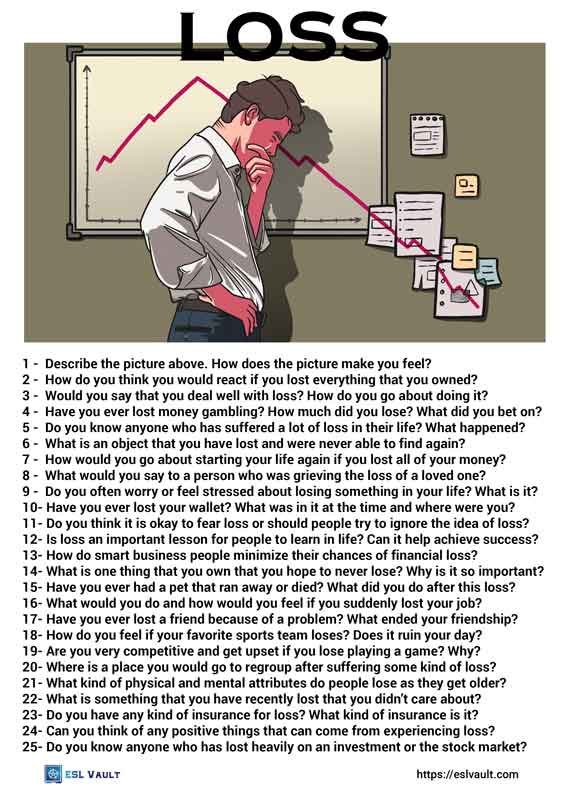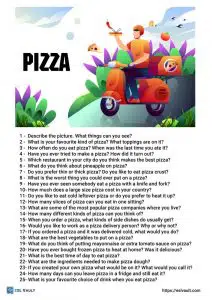Loss conversation questions
Loss is the state of either losing something completely or some of it. It is an unavoidable part of life that can be distressing at times or insignificant depending on the situation and person. These loss conversation questions can make for an interesting discussion.
The majority of the questions avoid the topics of death and dying but be sure to use your discretion as to whether or not they are appropriate for your students or speaking partners.
This is a fairly advanced topic for ESL learners, the most challenging terms in this speaking activity include – react, gambling, suffer, grieve, stress, minimize, wallet, financial, competitive, regroup, physical and mental attributes, insurance, positive, investment, and the stock market.
The loss conversation questions are –
How do you think you would react if you lost everything that you owned?
Would you say that you deal well with loss? How do you go about doing it?
Have you ever lost money gambling? How much did you lose? What did you bet on?
Do you know anyone who has suffered a lot of loss in their life? What happened?
What is an object that you have lost and were never able to find again?
How would you go about starting your life again if you lost all of your money?
What would you say to a person who was grieving the loss of a loved one?
Do you often worry or feel stressed about losing something in your life? What is it?
Have you ever lost your wallet? What was in it at the time and where were you?
Do you think it is okay to fear loss or should people try to ignore the idea of loss?
Is loss an important lesson for people to learn in life? Can it help achieve success?
How do smart business people minimize their chances of financial loss?
What is one thing that you own that you hope to never lose? Why is it so important?
Have you ever had a pet that ran away or died? What did you do after this loss?
What would you do and how would you feel if you suddenly lost your job?
Have you ever lost a friend because of a problem? What ended your friendship?
How do you feel if your favorite sports team loses? Does it ruin your day?
Are you very competitive and get upset if you lose playing a game? Why?
Where is a place you would go to regroup after suffering some kind of loss?
What kind of physical and mental attributes do people lose as they get older?
What is something that you have recently lost that you didn’t care about?
Do you have any kind of insurance for loss? What kind of insurance is it?
Can you think of any positive things that can come from experiencing loss?
Do you know anyone who has lost heavily on an investment or the stock market?

Loss idioms
After you have completed the loss discussion questions, you can share these idioms about loss with your class or group to continue the conversation. See if they can create sentences using them.
If you are at a loss about something you are confused and unable to explain or understand it.
To cut your losses is to put an end to something that is losing money, failing, or working out badly before the situation becomes even worse.
When something goes down the drain (especially money or effort) it is completely lost or wasted. For example, if you buy something that turns out to be worthless, your money has gone down the drain.
If you cry over spilt milk, you complain about some kind of loss that can not be recovered or an unfortunate event that has already happened. It is commonly used to tell people to forget about something that can’t be changed by saying “There is no use (or don’t) cry over spilt milk.




